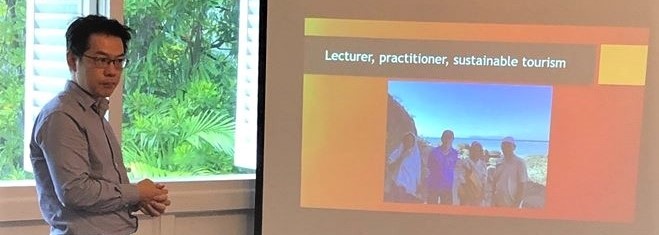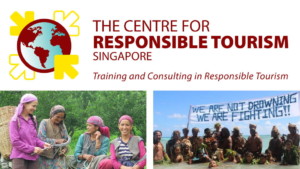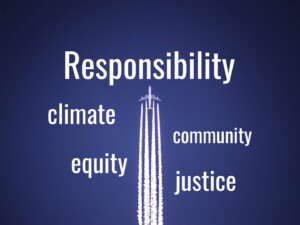Enrich yourself and your people with no-nonsense responsible tourism courses

Buzzwords abound in travel & tourism.
Singapore’s responsible tourism pioneer, Kevin Phun, excels in unboxing the premises and practicalities bundled within buzzwords … and in demonstrating how they are relevant.
He has to be good at that in Singapore, a prosperous city state whose inbound tourism stakeholders might be forgiven for thinking they don’t have to consider such things as ‘ecotourism’ or ‘pro-poor tourism’.
Kevin founded The Centre for Responsible Tourism Singapore (CRTS) to remind them.
“Just because Singapore is a wealthy city state, it doesn’t mean we should ignore the principles of responsible tourism at home,” he said.
“We have wild natural spaces on our island and underprivileged groups in our society — neither are typically associated with Singapore, even by many locals — not to mention our rich cultural heritage to nurture and protect.
“And, of course, destinations globally, as well as Singaporean travellers, stand to benefit greatly from a more consciously responsible approach to tourism,” he added.
READ KEVIN’S “GOOD TOURISM” INSIGHTS
All of this is to say that Kevin Phun is uniquely skilled at bringing to the fore that which may at first seem irrelevant, or too distant to consider.

CRTS has developed a series of short online courses for aspiring responsible tourism practitioners anywhere in the world.
CRTS’ courses establish a foundation of knowledge, and a framework for thinking about various aspects of a responsible travel & tourism industry.
They are always fresh.
“We regularly update the courses with new trends, new ideas emerging from the academy, and the practical experiences of professionals in the field,” Kevin said.
“It is all woven into the learning experience.”
Prospective students of these online responsible tourism courses need not be Singaporean. They can be from anywhere with an internet connection.
“Everyone is welcome!”
CONTACT CRTS | KEVIN PHUN ON LINKEDIN
Enrich your employees with the CRTS experience
As travel & tourism revives, CRTS’ online courses are perfect for introducing new people to some of the responsible tourism concepts of relevance to an organisation, as well as refreshing and updating returning staff.
“Our intensive courses are efficient exercises in professional development, and could be a motivating incentive for some employees,” Kevin said.
CRTS is offering a package deal for organisations: Bookings of 20 or more online courses attract a 30% discount. These can be used all at once as a group learning experience, or banked to be offered to individuals over time.
CRTS’ courses can also be delivered live and in-person by Kevin himself.
“We can tailor our responsible tourism courses to an organisation’s specific requirements,” he said.
“Contact CRTS or me directly. Let me know what you require. I look forward to working and learning with you and your team.”
CONTACT CRTS | KEVIN PHUN ON LINKEDIN

CLICK HERE FOR CRTS’ ONLINE RESPONSIBLE TOURISM COURSES
Unique responsible tourism courses you won’t find anywhere else
From starting out in ecotourism to designing heritage trails or corporate social responsibility programmes; from climate change adaptation to safeguarding intangible cultural heritage … There is surely something of practical interest to you and your organisation among CRTS’ range of short courses.
Indigenous people around the world and their intangible cultural heritage
Who and where are the indigenous peoples in the world? What are the challenges facing them? How have they tried to fight off and in some cases adapt to their challenges?
Part 1 — Who are the indigenous people? What are the issues they face?
Part 2 — What is intangible cultural heritage?
Part 3 — Challenges faced by indigenous peoples in safeguarding ICH
The value of nature
Learn how nature should be valued. Understand the true costs of our actions that impact the environment.
Part 1 — Nature’s true value
Part 2 — Valuing nature — The costs of our actions
Part 3 — Actions we can take — We can all play a part
Developing ecotourism in communities
Learn how to develop ecotourism in communities and about real challenges that textbooks do not teach you.
Part 1 — What is ecotourism?
Part 2 — Why ecotourism is suitable for many communities
Part 3 — Challenges in developing ecotourism
Part 4 — Ecotourism standards — key to success?
“Prepare now for a surge in ecotourism demand with a CRTS workshop”
Corporate social responsibility for small firms
Learn how small firms can incorporate corporate social responsibility (CSR) in their business operations and open up new opportunities and benefits for business.
Part 1 — What is CSR?
Part 2 — The need / push for sustainability for small firms
Part 3 — Challenges in implementing CSR for small firms
Part 4 — Implementing CSR for small businesses
Understanding safeguarding practices of intangible cultural heritage
Intangible cultural heritage, or ICH, is fast disappearing from our world. Many places are fast losing their ICH, be it languages, food, traditional knowledge, rituals etc. This course attempts to impart the knowledge about how ICH can be retained.
Part 1 — What is intangible cultural heritage?
Part 2 — Why should we protect and safeguard culture and heritage?
Part 3 — Examples of safeguarding of intangible cultural heritage
Part 4 — Challenges in safeguarding of ICH
Pro-poor tourism and climate change adaptation
Climate change is increasingly affecting many parts of the world where tourism is an important source of income for local people. Learn about how tourism supports climate change adaptation in this unique course.
Part 1 — Pro-poor tourism; what it is
Part 2 — Pro-poor tourism; some examples
Part 3 — Discussion; Laos’ ecotourism guidelines
Part 4 — Implementing pro-poor tourism
Part 5 — How tourism and climate change are related
Part 6 — Attractions and global warming
Part 7 — Adaptation to climate change
Part 8 — How does tourism adapt to climate change?
Part 9 — Successful climate change adaptation in pro-poor tourism
CLICK HERE FOR CRTS’ RESPONSIBLE TOURISM SHORT COURSES
CONTACT CRTS | KEVIN PHUN ON LINKEDIN
Featured image (top of post): Image by Gerd Altmann (CC0) via Pixabay.





